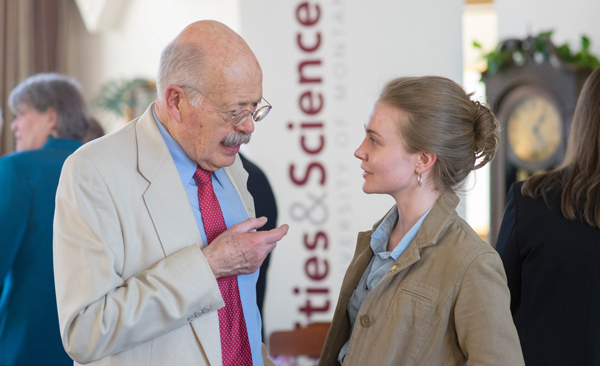- Editorial Offices
- 203 Brantly Hall
- Missoula, MT 59812
- (406) 243-2488
- themontanan@umontana.edu
Funding Elite Educators
Supporting UM's legacy of research and public education.
John and Frank Craighead are best known for their research on grizzly bears in Yellowstone National Park from 1959 to 1971. At the time they started their inquiries, there was little science about the animal, including how it lived and how many were in the wild.
The Craighead brothers spent a lot of time learning about the bear’s biology, but they made remarkable strides when they began putting radio collars on the bears for tracking. Their work led them to fight for designated wilderness areas for bear habitat, and they also documented their research through a National Geographic television special so the public could understand the life and challenges faced by UM’s animal namesake.
That legacy of research and public education is what has made the Craighead name so admired in the world of conservation and biology. And at UM, where John J. Craighead led the Montana Cooperative Wildlife Research Unit for 25 years, the name is a powerful magnet for top-tier researchers and educators.
Jedediah Brodie is the current John J. Craighead Chair of Wildlife Biology, an endowed position established in 2005 with $2.5 million contributed by private donors.
Brodie received his doctorate from UM in 2007, and he’s distinguished himself in numerous ways: He was a Fulbright Research Fellow to Malaysia from 2011 to 2012, and he is a lead author of the Intergovernmental Panel on Biodiversity and Ecosystem Services Asia-Pacific Assessment. He studies the ecology and conservation of large mammals in tropical rainforests, including how these mammals are endangered by habitat loss and unsustainable hunting.
“My team and I do fieldwork in the jungle to look at habitat selection by different species and to find out how they respond to anthropogenic threats,” Brodie says. “We then work with local government agencies to identify particularly important areas for conservation, such as habitat corridors that allow the species to move among national parks.”
He also studies how climate change affects wildlife and plants in Alaska’s national parks, and he directly incorporates what he learns about wildlife – and the social and political process of conservation – into the classes he teaches at UM. All of which is in the spirit of the Craighead endowment.
“John Craighead was a towering figure in wildlife conservation, and it’s both an incredible honor and very humbling to be in an endowed position in his name,” Brodie says. “Being in this position really facilitates the research that I do, as well as the engagement with government agencies to affect on-the-ground conservation.”
Meanwhile, Suzanne Tilleman, a professor of management and marketing and department chair in the College of Business, has worked on research supported by the Knick Family Faculty Fellowship, which she received in spring 2017. It’s a competitive fellowship, funded by UM Foundation trustee and alum Bill Knick and his wife, Cherrie, which recognizes research stars. This support allows Tilleman to focus on her work and advance the frontiers of knowledge.
Tilleman’s work doesn’t have the same public visibility as an apex predator, but it’s immensely important for the world we live in. She’s been recognized for her work on industrial symbiosis, including firms that generate and repurpose waste. She also looks at social movements and sustainable entrepreneurship within businesses, revealing a larger story about what kinds of choices businesses make and why.
“Receiving the fellowship indicates in my field that the University supports and recognizes my research,” Tilleman says. “And my research will continue and be better because of the fellowship.”
Just last year, distinguished UM historian Richard Drake was named the inaugural Lucile Speer Research Chair in History and Politics. The Speer Chair was established by a generous donor who wanted to honor the work of former UM documents librarian Lucile Speer, who was passionate about civics and politics, volunteering for the League of Women Voters, the Missoula Democratic Club and Eugene McCarthy’s campaign in 1968. At 73, she was the oldest delegate at the 1972 Montana Constitutional Convention, which rewrote Montana’s constitution.
The Speer Chair recognizes a distinguished scholar who explores both history and politics, and Drake is a shining example. He joined UM’s history department in 1982 after teaching at the University of California, Los Angeles; UC Irvine; Wellesley; and Princeton. In the years since, he has published five books, with a sixth coming out next year.
“I’m deeply honored to hold this position” Drake says. “I’m really still adjusting to what it will mean in my scholarly life.”
Williams, the UM Foundation CEO, says that when private donors choose to fund faculty, they create a ripple effect that builds the academic and research infrastructure of the University.
“Often that is part of what is deeply satisfying about giving that kind of gift,” she says. “There are donors who desire to elevate an academic program by providing the University with funding that can attract or retain faculty who lead their field. On campus, nationally renowned faculty mentor and engage undergraduate and graduate students in research. They also attract new students and faculty from other institutions who seek the opportunity to collaborate with them.”

Story by: Erika Fredrickson
Erika Fredrickson is a freelance journalist based in Missoula. She graduated from UM’s Creative Writing Program in 1999 and earned a master’s degree in environmental studies in 2009.




